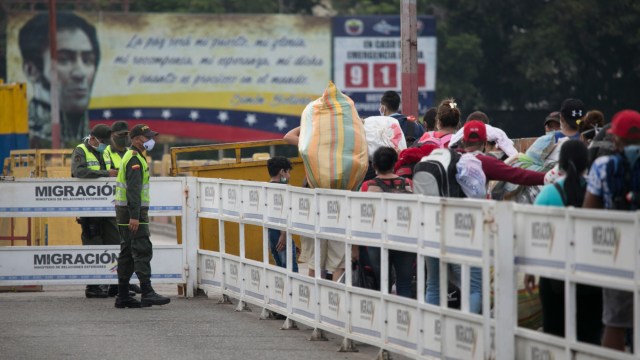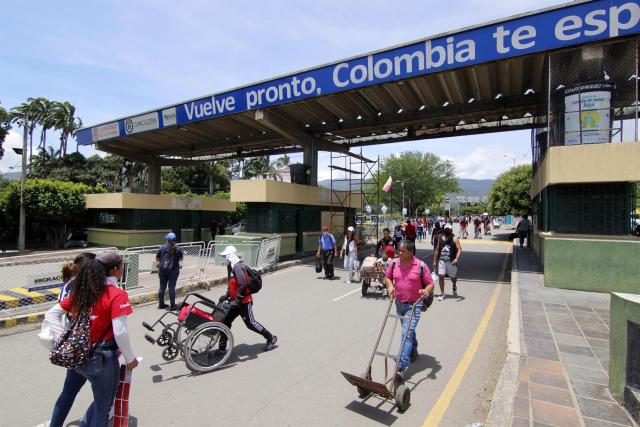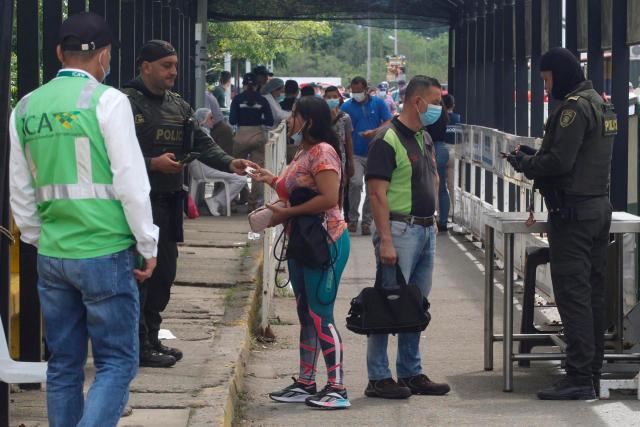
While roasting a rump of beef at a fast food outlet, Roberto Barbín, a grill chef on the border in San Antonio del Táchira, remembers that his life, that of his family, and that of his colleagues in the international heavy cargo transport union, changed completely as of 2015 with the arbitrary and unilateral closure of the international bridges that link Venezuela with Colombia by the Chavista regime. Thousands of people lost their jobs.
Luz Dary Depablos // Correspondent lapatilla.com
Mr. Barbín, like more than six million Venezuelans, was forced to emigrate and sell the heavy-duty trucks which for years were the livelihood of his household, but in February 2019 when there was an attempt to enter humanitarian aid, the chavista regime paralyzed all commercial activity with Colombia and he was left without any income. He then decided to migrate with part of his family to Argentina in order to start a new life.
Unfortunately however, while in Argentina, his mother who had remained in Venezuela died. This, added to the economic crisis that was beginning in Argentina, made him return to Venezuela again with the hope of starting a food sale, applying all the techniques learned in the South American country related to roasting meat.
“We had to reinvent ourselves due to the country situation and the closure of the border,” said Barbín. He assures that he loves cooking, so he saw in it the opportunity to turn this into a source of income, even though he does not obtain the same income that transporting freight generates.
Like all the inhabitants of the Colombian-Venezuelan border, Roberto Barbín longs for the formal steps to reopen so that the economy and quality of life can be reactivated in the border Municipalities of Táchira State, where more than 80% of industry and businesses continue paralyzed.
If bilateral relations between Venezuela and Colombia are restored, he does not rule out returning to the heavy cargo transport union and joining his longtime friends.
This “tachirense” hopes that his restaurant will be filled with new diners and thus also generate more jobs from his venture.
Reestablish Relationships

Barbín is just one example of the damage that the border closure has caused to thousands of Venezuelan and Colombian families, as recognized by the new Colombian Minister of Transportation, Guillermo Reyes, during his inspection tour of the “Tienditas” international bridge, from where he stated that “one can have political confrontations, but one cannot affect the citizens, the people”.
“Here we have hurt Venezuelans and Colombians. All the migration, all the poverty, all the situation of isolation (…) I think that great damage has been done, without a doubt. We have come in this government of President Petro to reestablish relations, to restore the brotherhood that has existed throughout history,” emphasized the high-ranking Colombian official.
“Everyone (transporters) is anxious that their “mules” (Colombian name for tractor trailers) can start crossing the border. The “trochas” (illegal trails, foot paths) have become the only way to cross. There has to be a regulatory policy for migratory control, and both countries will work on that,” Reyes said this was the mechanism to combat the smuggling that has become institutionalized on the border, mainly on the Venezuelan side of the border.
To End Smuggling
(FOTO 3)
Photo: EFE
On the other hand, Víctor Bautista, Border Secretary of the government of Norte de Santander Department, Colombia, bets that we must go “from disintegration to integration.” He considers it necessary to move from wishes to concrete plans, which must be achieved with safety indicators. “I insist that we must fight against the illegality of the trails.”
Bautista pointed out that: “extraction smuggling can never be a “mixed” trade (shady and legal). I think that on this issue we hope that the ministries and regional actors are able to speak honestly about what legal trade is through formal channels, and about the need to replace what illegal actors took advantage of (it)”.
He pointed out that the only thing that border closure policies cause is greater illegality and greater difficulties. “I believe that we should not delve too much into the past, we must draw the lesson that the cooperation policy is more effective for development and integration.”
For Bautista, integration “is the path we have to resort to at this time, and these 2,600,000 border residents (between Táchira and Norte de Santander) are the ones who know it more than anyone else.”
“The institutional framework has to fulfill its tasks and fight against illegality, because this is the clear message that we also have to proclaim here in this area,” said Bautista, hoping that relations will be restored in the coming weeks between the government Gustavo Petro with his Venezuelan counterparts.
Bridge Inspection

For his part, Guillermo Toro, general director of Invías in Colombia, reported that all the bridges had been inspected. “Some are ready to transit 10 ton (vehicles), others to transit in the order of 20 or 30 tons, while the rehabilitation and refurbishing plans are initiated that allow us to increase the load capacity that this bridge has (referring to the Tienditas bridge).”
Toro said that they have not yet had any contact with Venezuelan experts who may have made a report on international bridges.
“We have done the inspections on the Colombian side and we have been able to visualize the conditions of the bridges on the other side of the border, where we observe that in general they are in the same conditions,” explained the director of Invías.
Therefore, the new Colombian authorities, the representatives of the productive and business associations of the border, hope that the commercial reactivation will take place in the short term.
As announced by Colombian Foreign Minister Guillermo Reyes, “there is a desire for this to be an issue soon, but it must be a process based on work groups, on regulations and on how we are going to operate, but it will not be in a couple of years, I think it will be just a few weeks (for the resumption of binational trade,) he remarked.

